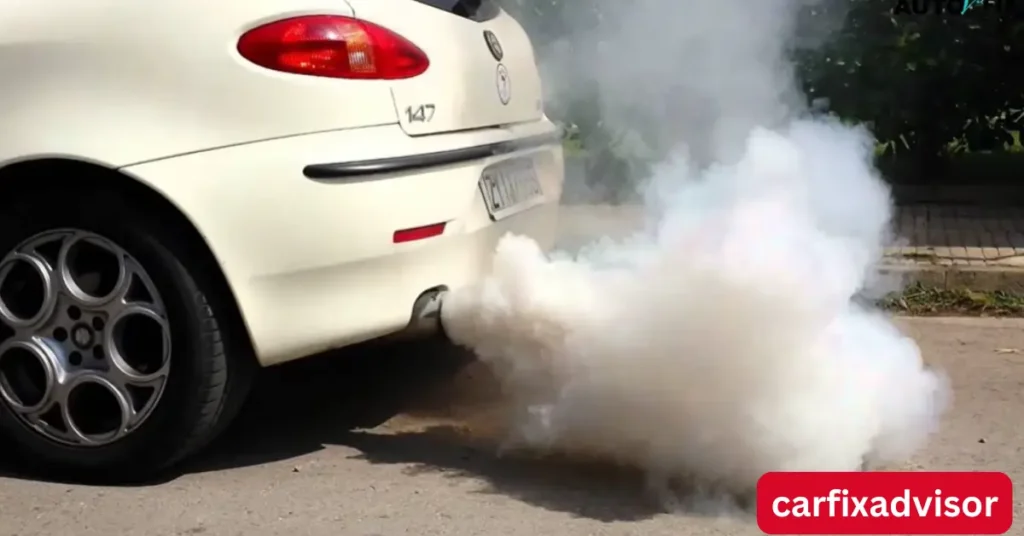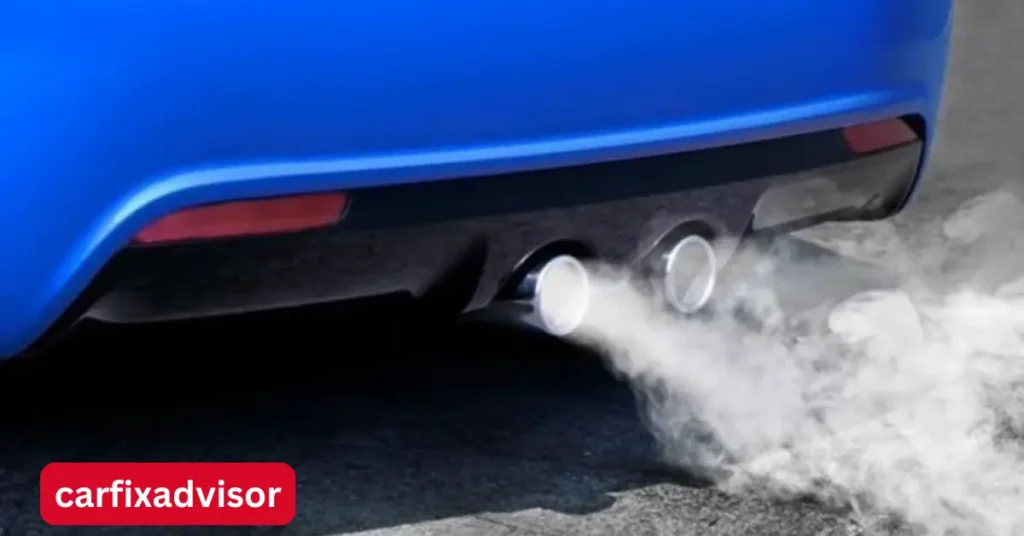Seeing white smoke from exhaust when accelerating but not overheating can be confusing and worrisome. Many drivers immediately think of severe engine damage or overheating issues. However, white smoke during acceleration does not always mean your engine is overheating. Understanding the possible causes of white smoke from exhaust when accelerating but not overheating can help you avoid unnecessary panic and take the right steps to maintain your vehicle.
This article explains the common reasons behind white smoke from exhaust when accelerating but not overheating, what the smoke means, and what you should do to address it. By learning about these causes, you can better protect your engine and keep your car running smoothly.
What Does White Smoke from Exhaust When Accelerating but Not Overheating Mean?
White smoke from the exhaust is often mistaken for a sign of overheating, but this is not always the case. When you notice white smoke from exhaust when accelerating but not overheating, it typically means moisture, coolant, or oil is entering the combustion chamber or exhaust system in small amounts. This vapor turns into white smoke visible through the tailpipe, especially during acceleration when engine load increases.
It is important to differentiate between white smoke caused by overheating and other causes that do not raise engine temperature.
Key Terms to Understand
White Smoke
Light vapor from the exhaust, often caused by steam or burning coolant.
Engine Overheating
When engine temperature rises above the normal operating range.
Coolant Leak
The escape of coolant fluid into engine parts where it shouldn’t be.
Head Gasket
A seal that prevents fluids like coolant and oil from mixing inside the engine.
Fuel Injector Seal
Gaskets that stop fuel leaks around injectors.
PCV Valve
A valve regulating pressure and gases inside the engine crankcase.
Common Causes of White Smoke from Exhaust When Accelerating but Not Overheating
When you experience white smoke from exhaust when accelerating but not overheating, the following issues are often to blame:
Coolant leaks into the combustion chamber: Even a small leak in the head gasket or cylinder head can let coolant enter the combustion chamber, creating white smoke when accelerating but without causing overheating yet.
Condensation in the exhaust system: Moisture inside the exhaust pipe can create white smoke during acceleration. This is common in cold or humid weather and usually disappears quickly.
Leaking fuel injector seals: Broken seals can cause extra fuel to enter the combustion chamber, resulting in incomplete combustion and white smoke when accelerating.
Faulty PCV valve: A malfunctioning PCV valve can cause oil to burn inside the engine, producing white or bluish-white smoke from the exhaust without overheating.
Worn valve seals or piston rings: Over time, these parts may let small amounts of oil enter the combustion chamber, which can create white smoke during acceleration even if the engine is not overheating.
Why White Smoke from Exhaust When Accelerating but Not Overheating Happens
It’s common to think that white smoke from exhaust when accelerating but not overheating means a serious problem, but often this is not the case because:
Minor coolant leaks cause white smoke but don’t immediately raise engine temperature.
Condensation forming in the exhaust system produces harmless white smoke during acceleration.
Oil burning from worn engine parts or a faulty PCV valve can cause smoke without overheating.
Understanding these distinctions helps you respond appropriately without unnecessary concern.
What to Do When You See White Smoke from Exhaust When Accelerating but Not Overheating
If you notice white smoke from exhaust when accelerating but not overheating, follow these steps:
Regularly check coolant levels: Slow leaks can cause white smoke and should be addressed before they worsen.
Inspect the engine oil: If oil looks milky or diluted, coolant may be mixing with oil, indicating a more serious issue.
Note when smoke appears: White smoke only during startup is often harmless condensation, but persistent white smoke during acceleration signals a need for inspection.
Look for additional symptoms: Rough idling, loss of power, or strange smells with white smoke require immediate professional attention.
Visit a mechanic: A professional diagnosis can detect issues like head gasket leaks, fuel injector seal damage, or PCV valve problems to ensure proper repairs.
Diagnosing White Smoke from Exhaust When Accelerating but Not Overheating
When you notice white smoke from exhaust when accelerating but not overheating, it’s important to diagnose the issue correctly. Multiple causes can lead to this problem, so following a clear step-by-step approach helps identify the root cause efficiently.
Step 1 Check for Coolant Leaks
Inspect the coolant reservoir, radiator, and hoses for any leaks or cracks.
Lower coolant levels can indicate that coolant is leaking into the combustion chamber, which often causes white smoke from exhaust when accelerating but not overheating.
You might detect a sweet smell from the exhaust if coolant is burning with fuel.
White smoke usually appears during acceleration as the engine works harder.
Step 2 Inspect the Head Gasket and Cylinder Head
A damaged or cracked head gasket is a common cause of white smoke from exhaust when accelerating but not overheating.
This fault allows coolant to seep into the combustion chamber without necessarily causing the engine to overheat immediately.
Look for signs such as milky oil or bubbles in the radiator coolant.
Pressure testing the cooling system can confirm whether the head gasket is compromised.
Step 3 Examine Fuel Injector Seals
Worn or broken fuel injector seals can leak excess fuel into the engine, creating a rich fuel-air mixture.
This rich mixture can cause white smoke from exhaust when accelerating but not overheating due to incomplete combustion.
Symptoms like rough idling and reduced fuel efficiency often accompany this problem.
Step 4 Test the PCV Valve
A malfunctioning PCV valve can cause excess oil burning, which produces white or bluish smoke especially noticeable during acceleration.
This is another potential cause of white smoke from exhaust when accelerating but not overheating.
Checking and replacing the PCV valve can restore proper engine ventilation and reduce smoke.
Step 5 Check Valve Seals and Piston Rings
Worn valve seals or piston rings allow engine oil to enter the combustion chamber.
This oil burns during acceleration and results in white smoke from exhaust when accelerating but not overheating.
Conduct compression and leak-down tests to assess their condition.
Repairing White Smoke from Exhaust When Accelerating but Not Overheating
After diagnosing the issue causing white smoke from exhaust when accelerating but not overheating, appropriate repairs are essential:
Fix Coolant Leaks: Replace damaged hoses, the radiator, or the coolant reservoir. Internal leaks may require head gasket or cylinder head repairs.
Replace Head Gasket: Repairing a cracked head gasket stops coolant from entering the combustion chamber and ends the white smoke issue.
Renew Fuel Injector Seals: New seals stop fuel leaks that cause white smoke and restore engine efficiency.
Replace PCV Valve: A simple and effective fix for smoke caused by burning oil due to poor crankcase ventilation.
Repair Valve Seals and Piston Rings: This more extensive repair fixes oil burning that leads to persistent white smoke when accelerating.
Preventing White Smoke from Exhaust When Accelerating but Not Overheating
Preventing the cause of white smoke from exhaust when accelerating but not overheating is the best way to maintain your car’s health:
Regularly check coolant levels and inspect for leaks.
Follow scheduled oil changes and replace filters as recommended.
Have your fuel injectors and seals inspected during routine maintenance.
Replace PCV valves on time to avoid oil burning problems.
Avoid prolonged idling and short trips that can cause condensation and smoke.
Use quality fuel and avoid additives that might damage seals.
Other Possible Causes of White Smoke from Exhaust When Accelerating but Not Overheating
While coolant leaks and damaged engine parts are the main suspects, there are also a few lesser-known causes of white smoke that don’t involve overheating.
Cold Weather and Condensation
In cold temperatures, condensation forms inside the exhaust overnight.
When you start the engine, this moisture turns into vapor and exits through the tailpipe.
This kind of white smoke is normal and should disappear once the engine warms up.
If the smoke lasts beyond the first few minutes of driving, there may be a deeper issue.
Using the Wrong Fuel or Additives
Low-quality fuel or improper additives can affect combustion.
This can cause incomplete fuel burning, producing white smoke under load.
Switching fuel brands or reviewing recent additive use can help pinpoint the issue.
Transmission Fluid Leaks (Automatic Cars)
In rare cases, a leaking vacuum modulator can pull transmission fluid into the engine.
The fluid burns inside the combustion chamber, creating thick white smoke.
This is more common in older cars with automatic transmissions.
It does not usually trigger overheating but can damage engine internals over time.
When You Should See a Mechanic
If the white smoke continues despite basic troubleshooting, it’s time to consult a mechanic. Ignoring it can lead to serious engine issues.
You should seek professional help if:
The white smoke doesn’t go away after the engine warms up.
Coolant levels drop without signs of an external leak.
You notice poor engine performance, rough idling, or misfiring.
There’s a milky appearance under the oil cap or mixed with the oil.
You detect a persistent sweet smell from the exhaust.
A mechanic can perform detailed checks, such as pressure testing, exhaust gas analysis, and internal inspection. These tests are critical when basic fixes don’t work.
Summary and Final Advice
Let’s recap the key points:
White smoke from the exhaust during acceleration without overheating is a warning sign.
It often points to a coolant leak, worn gaskets, or faulty fuel and PCV systems.
Less obvious causes include cold-start condensation, fuel issues, and transmission leaks.
Early diagnosis can prevent costly engine repairs and keep your vehicle safe.
Takeaway: Don’t ignore white smoke. Act early, stay safe, and if unsure—get help from a professional.


